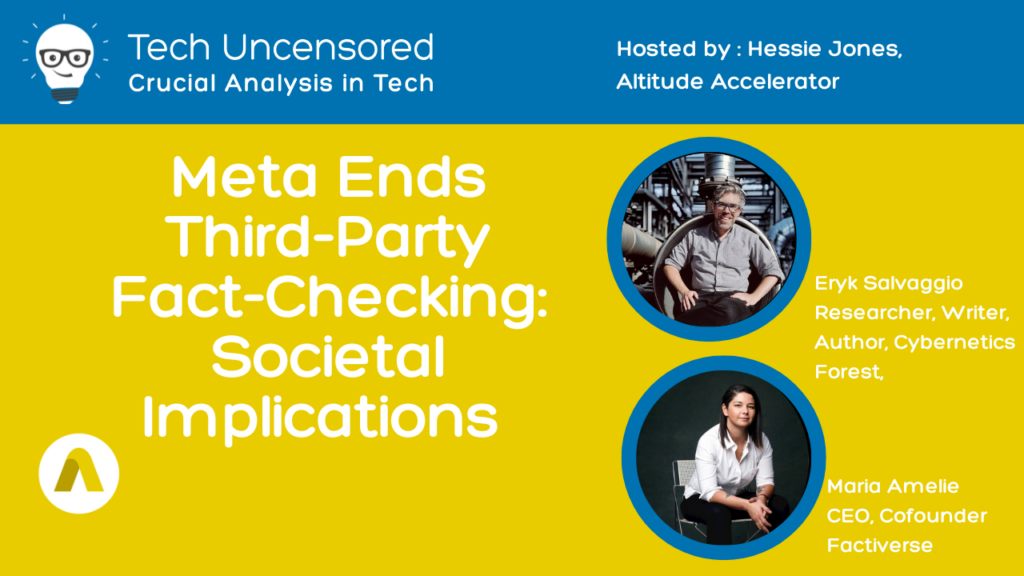Home » Meta Halts Third-Party Fact-Checking: What This Means for Users and Society
Meta Halts Third-Party Fact-Checking: What This Means for Users and Society

In a discussion led by Hessie Jones with Eryk Salvaggio and Maria Amelie, the focus was on the ethical implications of technology, especially in the context of social media platforms and their impact on public discourse and journalism.
Eryk Salvaggio’s Background and Insights:
Salvaggio specializes in tech ethics, particularly examining the interplay between algorithms and user engagement. He highlighted a growing trend where social media companies, like Meta, are aligning more closely with certain political ideologies, exemplified by their moderation policies that have affected LGBTQ+ themes. This pivot illustrates a shift towards catering to a particular social-right agenda, revealing a troubling correlation between algorithmic decisions and societal division.
Salvaggio posited that social media often prioritizes validation over factual reporting, leading users to share content that reinforces their beliefs rather than seeking out truth. He pointed out that contemporary social dynamics on platforms are steeped in emotional expression rather than constructive discourse, resulting in a climate where misinformation thrives.
Maria Amelie’s Experience with Fact-Checking:
Amelie discussed her organization's initiative to utilize technology for real-time fact-checking during significant political debates. They developed AI tools to assist fact-checkers overwhelmed by the volume of misleading statements made during these events. Notably, they identified a significant disparity in the frequency of false claims made by political figures.
She underscored the current challenges journalism faces, particularly in convincing audiences of validity. Users often express distrust toward automated fact-checking despite its reliability. This challenges media professionals to find innovative ways to engage and inform audiences, particularly younger demographics.
The State of Journalism:
Jones steered the conversation toward the existential challenges in journalism today. Both Salvaggio and Amelie concurred on the urgent need for a reevaluation of how journalism interacts with audiences in a digital age. Trust has become fragmented, requiring journalists to build credibility through personal relationships with their communities rather than solely relying on institutional backing.
Amelie observed that journalism must evolve to be more relatable and relevant, particularly regarding complex issues like climate change. She cited positive initiatives where media organizations are adapting their messaging to engage audiences better.
Salvaggio warned against the notion that platforms can be neutral arbiters of truth. The algorithms guiding content delivery are inherently biased and designed to cultivate engagement through divisive means. This lack of neutrality not only affects public debate but also undermines democratic principles by skewing the availability of information.
Conclusion:
The discourse encapsulated a critical moment in tech ethics and journalism amid a rapidly evolving media landscape. As users, journalists, and tech developers navigate these challenges, building networks of trust and fostering transparency will be crucial. The panelists expressed hope for journalists to emerge as community verifiers of trust, advocating for authentic engagement over algorithmic control. As society continues to grapple with misinformation and the implications of AI, the future will depend on how effectively these stakeholders adapt and collaborate for a more informed public sphere.
Altitude Accelerator
https://altitudeaccelerator.ca/
Altitude Accelerator is a not-for-profit innovation hub and business incubator for Brampton, Mississauga, Caledon, and other communities in Southern Ontario. Altitude Accelerators’ focus is to be a dynamic catalyst for tech companies. We help our companies grow faster and stronger. Our strength is our proven ability to foster growth for companies in Advanced Manufacturing, Internet of Things, Hardware & Software, Cleantech and Life Sciences. Our team consists of more than 100 expert advisors, industry, academic, government partners. The team helps companies in Advanced Manufacturing, Internet of Things, Hardware & Software, Cleantech and Life Sciences to commercialize their products and get them to market faster.


